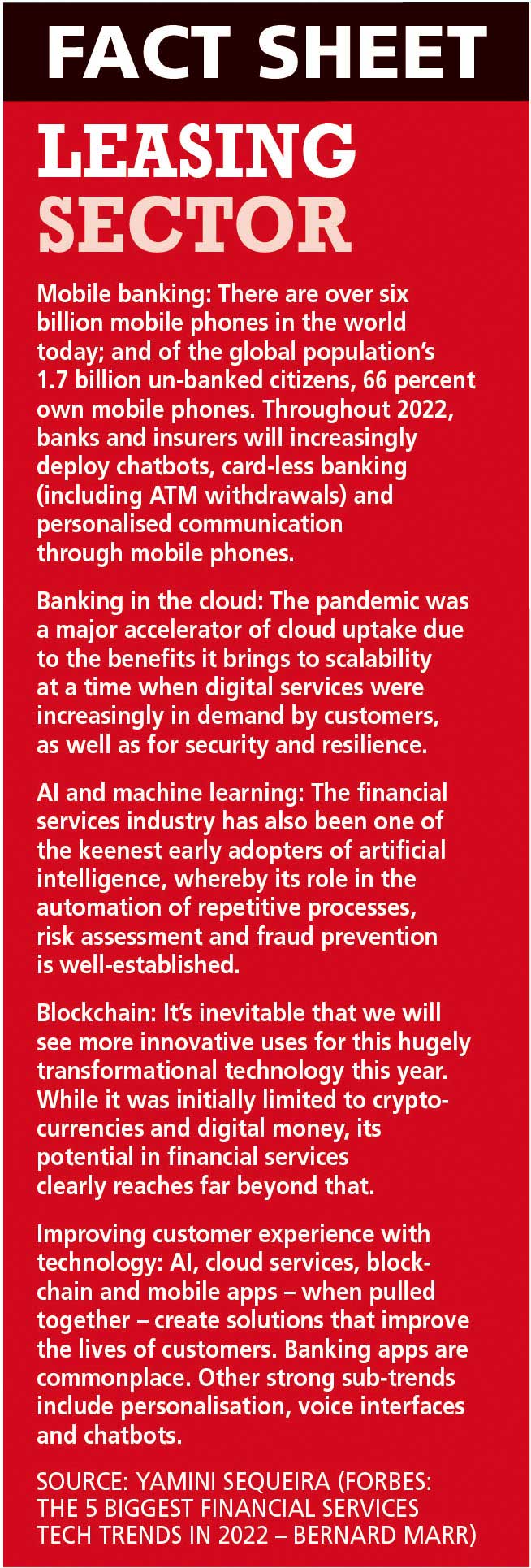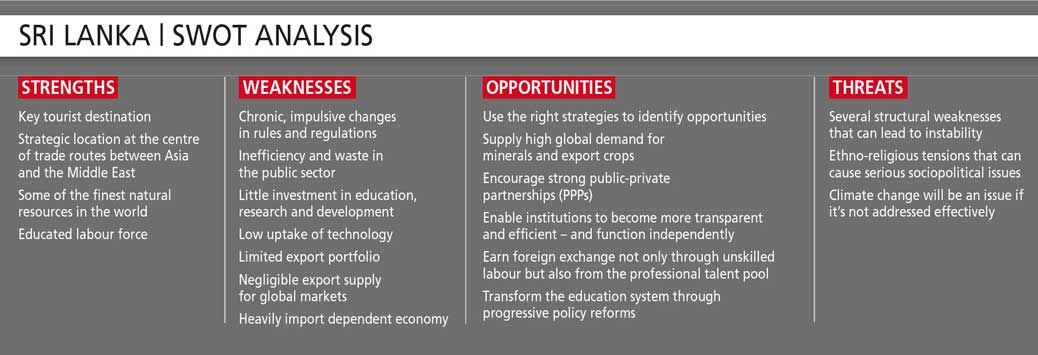LEASING SECTOR
THINKING OUTSIDE THE BOX
Shamindra Marcelline identifies new opportunities for leasing in many sectors
Compiled by Yamini Sequeira
 The Non-Bank Financial Institutions (NBFI) sector has faced considerable challenges over the past two years because of the pandemic. General portfolio returns were impacted due to various concessions granted through government driven initiatives to sustain businesses and individuals, along with measures taken by institutions to support the economic rebuilding programme.
The Non-Bank Financial Institutions (NBFI) sector has faced considerable challenges over the past two years because of the pandemic. General portfolio returns were impacted due to various concessions granted through government driven initiatives to sustain businesses and individuals, along with measures taken by institutions to support the economic rebuilding programme.
In addition, voluntary deferrals and lower collection rates impacted portfolio performance with a notable increase in non-performing assets.
Shamindra Marcelline avers: “Despite these challenges, the agility of the sector and its ability to adapt to the ‘new normal’ has resulted in an improvement of benchmark return ratios and increased profits. This is very encouraging and bodes well for the future. This turnaround is also a result of organisations adopting digital connectivity, and transforming front and back end operations in real time.”
The pressure seems to be easing as the sector’s total assets reached Rs. 1,488 billion while its return on assets (ROA) increased to 4.6 percent at 31 December 2021. The sector profit for the nine months ended 31 December last year amounted to 34.4 billion rupees – compared to Rs. 29.7 billion for the financial year ended 31 March 2021.
“The pandemic has pushed us to think outside the box and become early adapters of new ways of doing business – specifically by embracing e-based process improvement and digitalisation,” he points out.
 RAPID CHANGE Prior to COVID-19, there was an excess of brand-new and unregistered vehicle stocks in the country.
RAPID CHANGE Prior to COVID-19, there was an excess of brand-new and unregistered vehicle stocks in the country.
“It’s safe to assume that a decent quantity is still available. Businesses and individual retailers have made use of opportunities that have arisen due to the import ban, as well as new regulations. There is now a vibrant used vehicle market for buyers and sellers to operate in,” Marcelline affirms.
He adds: “Given the increase in prices, SMEs and retailers are raising capital for business and other investment initiatives by securing vehicles as collateral.”
Additionally, with new startups and a focus on agriculture, healthcare, IT and education, the traditional leasing sector’s landscape is changing rapidly.
Currently, the leasing sector comes under five consecutive Central Bank of Sri Lanka policy directions and recovery remains at a standstill on the portfolios under moratoria.
“Furthermore, capitalised interest on moratorium facilities doesn’t generate income within the deferral. SMEs – which are among the key customer segments in the sector – were significantly impacted due to the pandemic as they’re highly vulnerable to external shocks,” Marcelline reveals.
He continues: “The tourism and passenger transport sectors were also badly affected by the pandemic and had a negative impact on the sector’s profitability. Yet, with the economic recovery [late last year], we’ve seen an increase in profits and improvement in the quality of portfolios over recent months.”
“The impact of the pandemic will hopefully reduce, and local and global markets will become active again. Our objective should be to deviate from conventional financial business and look at various investments in other avenues too,” Marcelline suggests.
Sectors such as hospitality, IT solutions, commercial agriculture, healthcare, renewable energy and exports will need to grow exponentially to create opportunities for the leasing sector.
He asserts that “there are cross border opportunities in the financial services industry where businesses can tap virgin markets, as some players have already done successfully.”
Other areas that can be tapped are eco and health tourism, as well as hospitality, and positioning Sri Lanka as a hub for South Asian, Asia-Pacific and Middle Eastern business and finance.
“In addition, we have the possibility of moving into above retail level large ticket businesses.
Sri Lanka has always shown potential for being a hub for IT solutions – so it’s time to consider the development of this sector,” he urges.
OPPORTUNITIES When it comes to mergers and acquisitions too, Marcelline feels there are inorganic growth opportunities with key overseas industry players being in the game today.
He sees increased awareness among customers due to social media and notes that switching between providers is common. Further, e-commerce and digitalisation are also influencing customer behaviour.
Marcelline emphasises: “Consistent policy changes to adapt to the current situation and consistency when conditions normalise is the order of the day, along with acceleration of a consolidation plan and right sizing of companies so that we can build operations.”
Furthermore, stable and long-term funds are essential ingredients in a good financial services system. Low economic growth and currency depreciation are some of the more serious issues, in addition to import restrictions on motor vehicles, he observes.

ACTION STATIONS In his view, key strategies to drive the sector include “a stable asset base and solid capital structure, while more FDIs and investments are important to curtail currency depreciation.”
He posits that these investments will also help boost demand and the size of financial markets, adding that embracing e-commerce and digitalisation will enhance efficiency and effectiveness in industry through low-cost operational models, as well as faster delivery.
Marcelline notes: “Strong businesses with higher returns will stand tall and seize the opportunities coming in through various forms of cross border operations, mergers and acquisitions, and both vertical and horizontal growth.”
“There are opportunities with positive growth potential – due to ours being a developing economy – in the un-bankable micro and SME sectors, which consist mainly of micro entrepreneurs,” he says.
To this end, Marcelline elaborates: “In addition, a growing eagerness in the labour market to capitalise on professional knowledge reflects positively on the future of the sector as competitiveness leads to innovation and new customer experiences. Moreover, a greater priority for the digital transformation of front and back end operations has taken place with technological advancement.”
He remains concerned that people lack financial literacy, and risk being attracted to unscrupulous and unregulated market segments, predicting that volatility in terms of regulations will adversely impact the financial services industry.
“On my wish list is an economic policy that’s firmly established with several principles including a social market economy that delivers economic dividends to all being in place,” he states.
Marcelline sums up: “Sri Lanka is rolling out a plan to position itself strategically as a hub in the Indian Ocean. This approach will help us earn more income and contribute to a better life for all Sri Lankans.”




